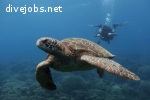Conservation Divemaster
Description
Description:
Do your PADI divemaster course with an environmental NGO and learn advanced diving techniques. Possibility of learning deep technical diving for free.
Scientific Diving
Many people who are interested in becoming scientific divers, expedition leaders, or otherwise make a career in underwater science or marine conservation find that a useful step on the way is to become a divemaster - often through PADI (although other recreational dive agencies are represented as well.) The philosophy is, that while PADI divemaster training has an end goal of getting candidates ready to take the role of a recreational divemaster, and handle in- and out of water supervision of inexperienced divers and non-divers alike, there are certain minimum standards to the course ensuring an understanding of dive safety, physiology, physics, logistics and in water supervision which are useful. In lieu perhaps of other relevant training to prove competency, the PADI divemaster course has become the de facto standard for diving personal in marine expeditions and academe outside of the jurisdiction of OSHA and scientific diving regulation.
To many considering divemaster training for the above reasons, the realities of a commercial dive shop can be disheartening. Greeting, selling to and catering to holiday-makers on their discover scuba diving experience can be exhausting and feel far removed from the end goal of employment in the field of conservation.
The project
The host organisation is a registred non-profit NGO, that offers divemaster internships and training with a different focus. Although the PADI training requirements have to be met to honour certification standards, the focus is oriented on scientific diving, technical diving and leading teams of researchers and organising and conducting work underwater in jobs ranging from conducting various survey protocols, salvage and construction of marine protected area infrastructure to removing ghostnets and documenting impact or siltation damage on coral reefs.
If you are not certified as a diver already, you will start your participation in our program by getting licensed through the PADI system of education. As the work we carry out on fragile reefs require divers with excellent skills, we add additional practice and excursion dives until you’re ready for the task. Typically volunteers do one or two courses, but as a divemaster candidate you can do multiple if needed to prepare for the DM training. Taking your diving courses through a demanding environmental organization instead of a lenient commercial dive shop, makes you a very, very excellent diver!
Once you are done with your primary divemaster training, you will start to take part in all aspexts of what goes on in the organisation.
Volunteer work
Duties performed by most volunteers are:
- Participating in two daily scientific scuba dives mon-fri. Saturdays we frequently go exploring new sites or fun diving instead of working dives.
- Kitchen duty (the duty rotates between groups, so you have one day a week just setting table, doing dishes - our cooks does the real magic)
- Taking care of our mangrove nursery and participating in replanting efforts
- Doing afternoon seagrass surveys while snorkeling
- Helping clean reefs and beaches of plastic garbage at least once weekly. (We do so in between scientific dives)
- Cleaning personal dive gear daily and diveshed once a week
- Filling scuba tanks
- Help prepare various outreach activities and community clubs (Earth Club, Lutoban Kids Club, etc)
- In school periods, you may help go and deliver lessons together with our staff (we'll teach you how!) in local schools.
- Cleaning the base and your own bungalow every Monday.
Volunteering is for people who want to get involved and get their hands dirty. Don’t expect any luxury at camp (well, other than the food which is amazing!). Accommodation is charming, but primitive. There are shared bathrooms and almost everything runs off solar power, including the wifi. There’s an outdoor jungle gym, and the whole botanical garden is more than ten hectares - large enough to go adventuring.
Please be aware that the PADI Divemaster rating is not a certification you buy, It is one you earn. There are a number of practical and theoretical exams you will need to pass, besides having to demonstrate maturity and professionalism throughout.
TECHNICAL DIVING
Marine Conservation Philippines is aiming to become a resource and training centre for research into the mesophotic range (30-100m). As such MCP values when divemaster candidates stay long enough to learn deep decompression diving and put it into use. We may offer technical diver training and diving to divemaster candidates who can commit for longer periods of time, and who show the required maturity, skills, and commitment.
MCP has the capability to teach and to conduct deep research and survey dives. Visiting scientists and program participants may enrol in this training on certain conditions. Technical diving is not for everyone. It is not a natural progression from the diving typically conducted at dive centres, resorts or liveaboards, nor is it a natural progression from the scientific diving we undertake. It is significantly more difficult, has significantly more risk, and requires significantly longer preparation and mental preparedness. In technical diving, even if you do everything right, there are hazards that are either non-present in regular diving or are severely aggravated in technical diving. We only teach program participants, who
- Show the required maturity for the task
- Understand and accept the significantly greater risk
- Accept that becoming a technical diver takes a long time
- Can dedicate the required time to actually put the training into work afterwards.
- 16 weeks, Free TEC 40 Course
- 20 weeks, Free TEC 40+45 Courses
- 24 weeks, Free TEC 40+45+50 Courses. Trimix courses available too, but you must pay for gasses.
Information
Company: Volunteer WorldLocation: Asia
Town: Zamboanguita
Country: Philippinen
Map position:
Contact
Contact person: Sorene-mail: Email: helpcenter@volunteerworld.com
Website: www.volunteerworld.com/en/volunteer-program/conservation-divemaster-in-philippines-zamboanguita





